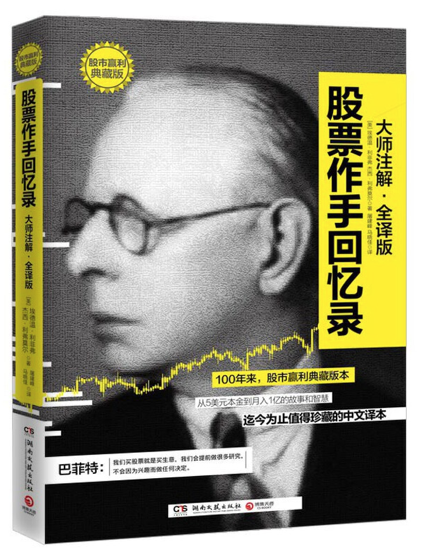Memoirs of a Stock Operator
Jesse Livermore was the most legendary "stock operator" on Wall Street in the early 20th century. He is a stock master who has influenced three generations of stock gods. Buffett, Buffett's teacher Graham, and Graham's teacher all spoke highly of Jesse Livermore, openly admitting to being deeply influenced by his story and wisdom. Anyone who can be called a stock god in the 20th century all praised this book. None of them has read this book, and their reading notes are now widely circulated.
DKK 78,00
Availability: In stock

 Chapter 1 Don't Ask Why, The Reason Comes Long Later Than The Opportunity
Chapter 1 Don't Ask Why, The Reason Comes Long Later Than The Opportunity
I started working directly after graduating from primary school, working as a handyman in a securities company, responsible for updating prices on the quotation board in the trading floor. I'm sensitive to numbers because I took a year of arithmetic in school and it was supposed to be a three year course. One client used to sit by the ticker and read the latest prices aloud, and I was especially good at mental arithmetic, so it wasn't too fast for me to read, and I could easily keep up. I have always memorized numbers very quickly, without any effort at all.
There are many other colleagues in the company, and of course, I have become friends with them. But that's what I do, and I'm busy, from 10 am to 3 pm when the markets are active, so I don't have much time to chat. Of course, I don't like chatting during working hours.
However, no matter how busy the transaction was, it did not prevent me from thinking about it. In my eyes, those numbers do not represent price, that is, how much money per share. They are just numbers. Of course, they must have some meaning; they are always changing. I am only interested in one thing, and that is "change". As for why they change, I don't know, and I don't care, I've never thought about it, I just know they change. This is what I think about for 5 hours on weekdays and 2 hours on Saturdays: they are constantly changing.
This is how my interest in stock price behavior began. I have a good memory for numbers and can recall the details of stock price performance the day before, and my penchant for mental arithmetic helped me in that way.
I have noticed that before any rise or fall there is always some "habit," if it can be called a habit, in stock prices. Similar situations are repeated endlessly, so it becomes a kind of symptom, which can help me indicate its direction. Although I am only 14 years old, I have silently observed the same situation hundreds of times. So, I found that I began to unconsciously compare today's stock price fluctuations with yesterday's to see if my measurements were accurate. It didn't take long for me to start consciously predicting where prices would go, because, as I said, I was guided *by what stock prices had done in the past. I had the "insider" in my head and watched the price go all the way to the outcome I predicted; I also "timed" it, you know what I mean.
For example, you will find that at certain points, there is basically little difference between buying and selling. The stock market is the battlefield, and the fluctuation line is your telescope, and you can have a 70% chance of winning by relying on it.
I quickly learned another truth: there is nothing new on Wall Street, and there cannot be. Speculation is as old as the mountains, eternal and unchanging. What happened in the stock market today has happened in the past and will happen again in the future. I haven't forgotten that to this day, and I think I've been trying to remember how and when certain things happened, and I remember those experiences, and they cost me less in my trading.
I am obsessed with this prediction game. Since I especially want to predict the rise and fall of all active stocks, I bought a small notebook and wrote down all the information I saw. This is not the so-called "virtual transaction"; many people do virtual transactions, and they are not ecstatic when they make millions, and they are not afraid of going to the poorhouse when they lose millions. I just write down whether I got it right, that is, the direction of motion; in fact, I am most interested in checking whether I got it right, that is, whether I guessed right.
For example, after studying all the oscillations of a day in an active stock, I can conclude that this wave has occurred many times before, after which it will break the current price 8-10 points. On Monday, I usually write down the stock name and price, refer to its previous performance and predict the trend on Tuesday and Wednesday, and then I will use the details printed by the ticker to do actual verification.
So I became interested in the ticker, and in my head, the moves suggested all the way up or down. Of course, there is always a reason for volatility, but the price recorder won't tell you why, it doesn't explain why. I didn't ask why when I was 14, and I don't ask why now that I'm 40. The reasons for today's rise and fall may not be known until two or three days, weeks or even months. But what's the use of knowing, and what does it matter if you don't know? Your relationship with the ticker is now, not tomorrow. The reason can be said later, but now, you can either act now or lose the opportunity. I have witnessed this truth with my own eyes time and time again. You should remember that in the first two days, all the stocks in the market rose sharply, but the stock of the air traffic control company fell by 3 points. It's a fact, it's a result. On the second Monday, the board of directors said that there will be no dividends, and this is the reason. The board of directors already knew the company's decision, so if they didn't sell it, they at least didn't buy it. If the support is not bought internally, there is no reason for the price not to fall.
I kept it in my little notebook for about six months. Instead of going straight home after get off work, I jot down the numbers I want to study changes. I've been looking for exactly the same or a similar wave. In fact, I was already learning how to read discs, although I didn't realize it at the time.
One day, while I was having lunch, a handyman who was older than me ran up and quietly asked me if I had any money. I said, "Why are you asking this?"
He said, "Well, I have the inside story of Burlington, and if anyone does it with me, I'll play."
I asked, "How much do you want to play?" In my opinion, the only people who can play this game are the customers, the adventurers with a lot of money. Why do I feel this way? To play this game, you need hundreds or even thousands of dollars, which means you have to have your own private carriage, and the coachman can wear silk hats.
He said, "I mean, just kidding. How much money do you have?"
"How much do you want?"
"Well, with 5 yuan as the principal, I can buy 5 shares."
"How does this work?"
"I will give the money to a speculator as a margin, buy Burlington, and buy as much as I can. I will definitely make money, just like picking up money, and our money will double in no time."
"Wait a minute," I said to him, and took out my little notebook.
I'm not terribly interested in doubling the money, but he said Burlington would go up, and if true, my pocket book should show that too. I looked it up and was sure, from my records, that Burlington was going to go up, and it was doing what it was doing before it went up. At the time, I hadn't traded anything, and I'd never bet anything with anyone. But I thought it was a good chance to test whether my work-cum-hobby was accurate. I immediately thought that this theory would be meaningless if my little book could not predict it in reality. So I gave him all the money I had in my pocket, and he took our "fund" to a nearby bucket shop and bought Burlington. We cashed out two days later and I made $3.12.
It was the first time I traded in my life, and then I started doing it alone in the bucket shop, where I would buy or sell at lunch. I don't think it matters whether I buy or sell, I'm just playing a game with a system. I don't like specific stocks, and I don't have any special theoretical support. I only know elementary arithmetic. In fact, the way I was doing it was the best form of trading in a bucket shop, where all the speculator had to do was bet on the fluctuations in prices.
The money from the trade soon far exceeded my handyman wages, so I resigned. Although my family objected, they didn't say much when they saw the money I brought home. I was just a child, and the wages of a handyman were not high, but I made a lot of money doing stocks.
I made my first thousand dollars when I was 15, and made that much in a few months. When I stacked the wads of cash (plus the ones I had brought home) in front of my mother, her eyes filled with awe. She said she wanted me to put the money in the bank before I couldn't help*; she said she had never heard of a 15-year-old who made so much money from nothing; she didn't even believe it was real money; This worry, worry. But for me, as long as I can keep playing and prove my predictions are right, nothing else matters. Use your brain to make the right predictions, that's what it's like to do. If I bought 10 shares and it turned out I was right, I was 10 times right by buying 100 shares. For me, this is the meaning of the amount of principal, and I will be more right if the principal is more. Does it take more guts to buy 100 shares than 10? No, there is no difference. If you have 10 yuan, you can buy 10 yuan. If you have 2 million yuan, you can buy 1 million yuan and save 1 million yuan. The former will require more courage.
In short, when I was 15 years old, I lived a moderately prosperous life relying on the stock market. I started out in small bucket shops where you would be taken as John Gates in disguise or JP Morgan in disguise if you bought 20 shares at a time. The bucket shops back in the day never cheated their customers, and they didn't have to, because even if a customer guessed right, there were plenty of ways for them to spit out their money. The bucket shops are very profitable.
You must be logged in to post a review.
Related products
-
raising boys
DKK 78,00










Reviews
There are no reviews yet.